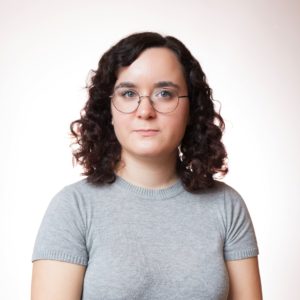The social worker parks us in the driveway. In my lap there’s a duffel bag and backpack, which I stuffed, hurried, when we stopped at my apartment on our way from the hospital. The social worker—Andrea—idled outside while I ran in. I barely remember what I grabbed before stumbling blindly back into her car.
I’m not ready to be home, in that empty apartment. Not yet.
As I exit the car, the green door of the Halfway House opens. A fluffy dog trots out to greet us. It jumps up on my legs, and I don’t quite register it yet, that there’s this alive thing asking for my attention. I stand there, frozen, arms wrapped around my bags. After a few moments, the dog shuffles off to Andrea, and she bends down to scratch its ears. She ushers me inside. The dog follows. And the door closes, heavy, behind us.
The first thing they do is search my bags, finding clothing, a notebook, and a paperback I had with me at the hospital. Toiletries, too—including a razor, which they fish out. They tell me they’ll lock it in a cabinet in the office. Along with it, they lock up my medications (Andrea got the prescriptions from the hospital).
The second thing they do is throw all my clothes into the dryer. To get rid of bed bugs, they say. It’s only a short cycle. Once it’s over, they have me change into some of the bedbug-free clothing (a pair of sweatpants and a sweatshirt from the university apparel store) and throw what I had on into the dryer, as well. Finally, they hand me some sheets and show me to my room on the second floor.
It looks like a hotel room, with two single beds, two bedside tables, and some cabinets. A length of heavy curtain blocks the window, absorbing the fading light. I am told to make my bed and come back downstairs to prep for dinner.
I glance at the other side of the room. The bed is disheveled, with an extra throw blanket on top of the standard bedding. There’s a small suitcase with clothes spilling out onto the carpet. A crossword puzzle book sits on the table, and a pack of tarot cards peeks out from under the bed. I struggle with the fitted sheet, place my book and toothbrush (bristles up) on the table, and shove my bags against the wall. Then I pad downstairs in my fuzziest pair of socks.
I pass through the living room. It has an old TV set and a desktop computer. I see a flash of dark hair on a couch. Without looking more closely, I move on and enter the kitchen.
There’s a man in his thirties, I think, setting the table with floral plates that look like they belong in a cottage. A short woman is browning ground beef in a pan, and the other social worker, Laurence, is chopping vegetables. She waves me over and hands me the knife, asking me to finish up the veggies. It’s taco night.
I dice the tomatoes, eyes glued to the knife in my hand. It’s so sharp, breaking the skin, slicing through the tomato without flattening it. I think about how it’s the first sharp object I’ve held in over a week—a week of asking permission to use a pen to track scores for a Scrabble game, the board dilapidated and half the letters missing.
The pen was the sharpest object we could have around, and I used it loads. My mom flew down as soon as she could after being contacted by the hospital. I asked her to bring my notebook during visiting hours.
At the time, it had seemed so important to write everything down: the food I ate, the shows I watched on the one TV set, the Scrabble games. To write about the people I had met and the talks with the doctors. I thought that, if I didn’t write it all down, the memories would fade. I was right. I already feel the memory of the hospital going blurry, and I think about the scribbles in my notebook describing a place no one wants to go, a place no one even wants to think about. I don’t plan on reading them anytime soon, but it’s comforting to know they’re there. An explanation. An apology.
A girl comes in from the living room. I recognize the dark hair I had passed. Andrea tells me her name is Nora, and that she’ll be my roommate while I’m here.
We eat dinner, and Laurence explains the rules of the house. While I stay here, I must help out with the chores at least once a day: either buy groceries, make meals, or do the dishes. The TV set is to be turned off at five on weekdays and seven on weekends. We can use the computer one hour at a time, and there is no open Wi-Fi for personal devices. We must be back at the house by nine every night, and lights out is at ten.
I’ve redrawn my features into a blank stare: the expression I wore during my stay at the hospital. It’s what I’ve learned to return to. This numbness. These wide eyes. This slightly open mouth. It’s the closest thing to home I’ve had in a while.
Laurence asks me to come by her office at nine, and she gives me my medications. She watches me swallow them. I resist the urge to stick out my tongue and show her my empty mouth. Hospital habits.
She says good night, and I duck upstairs to my room.
◊ ◊ ◊
I lurch awake, the yelling from my dream ringing in my ears. My eyes snap open, and I gasp, swimming in these unfamiliar sheets, blind in this utter darkness. There’s no window of light on the door like there was at the hospital. I feel the corners of my bed. No restraints. I hear breathing and remember Nora, snoring faintly a few feet away. The snoring stops, but she doesn’t move. It’s too dark, too quiet. I shuffle out of bed and step downstairs, careful of creaking steps.
I turn on a light in the kitchen, and it’s too bright. I squint, my vision blurry. I open the fridge, listen to its hum, but I don’t see what’s inside. I only feel the coolness on my face.
I hear a creak behind me, and, turning, I find Laurence in mismatched pyjamas.
“Hey,” she says, blinking in the light. “What are you doing up?”
I tell her I was hungry and came downstairs for something to eat.
“What do you feel like? I can make you something.”
Shaking my head, I tell her I changed my mind. She watches me climb up the steps. I know she stands long enough to hear my footsteps return to my room and the door close.
I feel like a child who’s been scolded.
I stare up at the ceiling, blanketed once again by darkness.
◊ ◊ ◊
Because I sleep in too late, Laurence knocks on my door to wake me for breakfast. She made blueberry pancakes. I eat them plain, cutting them up with the side of my fork. While we eat, we choose our chores for the day. Laurence asks me if I want to go grocery shopping, and I say I don’t know where the nearest store is.
Lie. My apartment is a few blocks away.
She asks if I can help make the meals, and I say I don’t know how to cook.
She eyes me, then says it’ll be my job to do the dishes, then. We clear the plates, and I slip them into the dishwasher.
I float through the rooms of the house, deciding what to do. The living room has a box of old cassette tapes. I flip through them. Nothing catches my eye. I glance at the computer. I know there are people wondering where I am—classmates, coworkers, maybe even some friends. But the thought of explaining myself makes my body heavy, and I move on, trying to shake off the weight. In the hallway there’s a wall of pamphlets for shelters for women experiencing abuse, queer youth centres, and crisis centres like this one. Reading their covers exhausts me, and I return upstairs.
At the top of the stairs I pass a room that seems to emanate light. I backpedal to peer at it more closely. It’s filled with art supplies lined up on shelves, along with a large table. There are no curtains to keep out the sunlight. It warms the air. The words the bright room pop into my head, and I instantly decide to call it that. I am drawn, like an astral body to a star, and step inside.
I scan the shelves and pick a box of soft pastels and some construction paper. I choose colours that don’t make a lot of sense: purple paper and orange pastels. I draw a face, mine, from memory. I stare at it. It doesn’t look like me at all, but I like it. I choose green paper and pink pastels, and I draw Josh’s face. Josh, the boy from the hospital. It looks nothing like him, and I hate it. I feel like it’s very important for me to remember his face, but the memory is slipping away. The picture does nothing to help me retain it.
When Nora says my name, I realize how deeply I’m frowning at the picture. I reshape my face into its blank stare as I look up at her.
“Want to go walk Chichi with me?”
“Chichi?”
“Andrea’s dog.”
I wait long enough for her to realize that I’m not going to answer.
“She says you won’t have to do the dishes tonight if you do.”
I sigh, then tell her I’ll meet her downstairs.
◊ ◊ ◊
We walk through a park I know well, though I pretend it’s foreign to me. Nora holds Chichi’s leash, and I hold the poop bags. I sort of feel like talking, but I don’t know what to say. All the regular topics feel insignificant. The Halfway House and its residents seem to transcend such formalities. I also don’t want to pry or make Nora uncomfortable.
She sits down on a bench, and I drop next to her. I think she’s waiting for something. This whole time, her face has been as blank as mine. All the occupants of the house seem to have this same expression. This blankness. Like they’re trying hard to conceal the thoughts lingering beneath it.
The silence extends, and I cave.
“Can I ask you a question?”
“Sure.”
I breathe. “Why are you here?”
She shakes her head. “Not yet,” she says, and I understand. “Later, maybe.”
I store the answer in my mind. Later. Yes, I can wait.
She doesn’t ask about me. She seems to know my answer would be similar to hers.
◊ ◊ ◊
The yelling returns that night. It’s Josh’s voice in the next room. He’s banging on the walls, screaming to be let out. The patients have been sent to their rooms, their doors locked, while the nurses deal with the commotion. I’m lying in my white bed, unable to move, feeling the shiver of the walls as Josh throws himself against them. His voice cracking, his feet stomping. In this moment I am afraid of him: this skinny boy, a university student, now unleashed. The nurses enter his room, and a struggle ensues. I shut my eyes tightly and feel myself crying. Josh’s voice fades, and I don’t want to think about what they’re doing to him. The noise dwindles until I only hear my breath, skipping like a scratched record.
I open my eyes and am back in the Halfway House, in a real bed with solid legs instead of wheels. My breathing slows. I wipe my eyes. They’re not as wet as I thought they were in the dream. I sit in this silence, this return to silence, for a few minutes.
Then, Nora says my name.
“Yes?”
“Are you okay?”
I don’t say anything, and she understands.
“Do you want some company?”
“Yes.”
Nora climbs out of bed, and I make room for her. She lifts the covers and joins me.
The touching comes gradually. First my hands.
“Is this okay?” she asks, and I say yes.
My hair. My face. “This?” Yes.
My stomach. My breasts. “This?” She’s so warm from the blankets, so gentle. Like a bird fluttering and landing on my skin, inches at a time.
I feel the tears and realize I’m crying. It’s very quiet. I don’t shake. In fact, I feel frozen in place, just like I did in the dream.
Nora stops, then scrambles out of bed.
“Holy shit, holy shit, I’m so sorry, I’m so—” She’s nearly falling over herself, trying to get away. “I’m sorry, I thought—I mean, like, I thought you were—you know—”
Then I’m speaking over her, trying to speak over the crying. “No, no it’s okay, it’s…it’s all right.”
She stops moving, and for a moment everything is quiet again. Then I whisper, “Please stay.”
Slowly, more tentatively than before, Nora climbs back into bed with me. She is careful as our bodies graze each other. Our arms touch as we lay on our backs, staring up at the ceiling.
“Are you okay, though? Actually?”
I say yes. I say, it’s just been so long. Since someone touched me. Since I’ve had human contact.
She nods, and it moves the bed.
I say, will you hold me? And she does.
◊ ◊ ◊
The next day, I am once again in the bright room. I’ve fished out more construction paper and pastels, and I’m looking through an old magazine for a face to draw. I study them, trying to recreate the features from memory. I am moderately successful. Some turn out better than others.
Nora comes in, dragging her feet in fluffy slippers.
I look at her. Really look at her, the way I looked at the magazines. The slightly flat nose, the brown skin, the round eyes. I try to memorize her face. She has soft features, soft edges, and sometimes I think her outline is fading into the background. But in this moment, with the sunlight showering her face, she is vibrant.
She sits across from me. “Do me.”
I gulp. “What?”
“Your drawings. Draw me.”
Taking a deep breath in, I reach for some materials. Nora: she gets yellow paper and pink pastels. I look up, then down, then up, trying to draw her face as I see it. The pastels only allow for broad strokes, not details. So I focus on shapes and shadows rather than fine lines.
As I put the pastel down, she bursts out laughing. “Is that really what I look like?”
I smile a little. “No. I’m just bad at this.”
“It’s still better than anything I could do.” She digs for something in her pocket. “Have you ever had your cards read?”
“My what?”
“You know. Tarot cards.” She takes out a box, and inside there’s a deck of cards. “Close your eyes and think of a question.” I do so, and I hear her shuffling the cards. The shuffling stops. “Now open your eyes.”
In front of me are three cards, face down. From left to right, Nora flips them over, revealing a recurring theme of fairies: most playful, some cunning.
“They’re beautiful,” I say. “What do they mean?”
“I have no idea.”
I tilt my head in confusion.
She breaks into a smile. “I don’t actually know how to do this. I just think they’re really pretty. Sometimes I look at the pictures and try to guess their meaning.”
I scan them. Try to interpret the images. But the fairies seem just as unsure of my future as I am.
“What was your question?” Nora asks.
I don’t answer. Instead I look at her and ask, for the second time, “Why are you here?”
She takes a long, deep breath before speaking. “Two years ago, I went back home to live with my parents. They do their best to take care of me. But they can’t always afford to take time off work when I can’t be alone—when it’s too dangerous for me to be alone. So when it gets bad, they send me here.”
“You’ve been here several times?”
“This is my fourth.”
A moment of silence.
“You’re transitioning from the hospital, right?” she asks.
I nod. She doesn’t ask anything more. She doesn’t have to.
◊ ◊ ◊
That night, I agree to help Andrea make dinner. I stir spaghetti in boiling water while she pours kibble into a bowl for Chichi. The light outside is already starting to fade. Fall will be ending soon.
“I talked to my mom today.”
Andrea looks up, surprised. I’ve barely spoken a full sentence in her presence yet.
“Yeah?” she responds after recovering. “What did she say?”
“She’s flying back into town tomorrow. She’ll be staying with me for a bit.”
“That’s really good news!” She opens a jar of tomato sauce and pours it into a small saucepan. “I was actually hoping to meet with you tonight to formulate a plan. Figure out how long you need to stay here until you feel ready to go home.”
I nod. “I think I’m ready. Maybe not to be alone yet, but to sleep in my bed. It’s been so long. I feel like I’ve been away for months.”
She smiles sympathetically. “That seems like the best course of action, then. What time is she getting in?”
“Early. Seven a.m.”
“Perfect. I’ll still be here. I can unlock your meds and your razor.”
“Thanks,” I say. As I do, I feel the walls of the house vibrate to attract my attention, reminding me that this is a transitional space. This is not the place to make meaningful relationships. It’s not someplace to get used to.
◊ ◊ ◊
I feel fluttery as I get into bed, wondering if Nora will ask to join me again. But as she comes in, she goes straight to her own bed. I close my eyes and pretend I’m asleep. She turns out the light and closes the door. Her sheets rustle for a few seconds, and then stop.
“Are you awake?” she whispers.
“Yeah.” She doesn’t reply, so I add: “Why?”
“Just wondering,” she sends back.
There is silence again, but a surface silence: meant to be broken.
“I’m leaving tomorrow.”
It takes a while for her to reply. “That was fast.”
“Do you know when you’re leaving?”
“No.” Pause. “Sometimes I think, this is it. This is the episode that doesn’t end. This is the one I won’t come back from.”
I don’t know what to say, so I say, “Don’t say that.”
“Maybe we’re going in opposite directions. Maybe I should go to the hospital, not home again.”
I take some time to gather my thoughts, to phrase them in the way I want. “Things don’t get better in the hospital. The hospital is… a holding cell. You’re not there to learn anything or get better, you’re just there to wait out the episode, to let the medication do its work. To be safe. Restricted, confined, and belittled… but safe.” I wipe my eyes, which have become wet. “You only go there if you have no other choice. You—you have a choice.”
I wait a long time for her reply before I realize that she’s snoring again. I turn on my side, away from her, and squeeze my eyes shut. I think, Please don’t dream of Josh. Please don’t dream of Josh…
Dream of Nora.
And I do.
◊ ◊ ◊
Nora doesn’t come down for breakfast the next morning. Andrea doesn’t address it, but I assume she tried to rouse her, to no success. The chores for the day are selected, and I offer to clear the plates before I leave. I get a text from my mom saying that she’s leaving the airport. I have about an hour until she arrives. I go to my room and pack the few items I brought with me. Nora is facing the wall. I can’t tell if she’s sleeping or not. I gather up my drawings and visit the bright room one more time.
Sitting at the table, I try to choose the right paper and pastels. I want to leave Nora something.
I know nothing about this girl. Nothing about who she is, where she lives, what she likes. I sit and think for nearly an hour, and I come up with nothing. Then the doorbell rings, and I hastily scribble my email address on a slip of paper. When I grab my things from my room, I leave the note on Nora’s bedside table. I silently say goodbye, then ease the door closed behind me.
◊ ◊ ◊
I think of that piece of paper now, eleven months later, as I’m standing in front of the Halfway House again. I wonder if my handwriting was illegible, or if I misspelled the email address. I wonder if she didn’t see it, or if it fluttered down, out of sight, behind the table. Or if she threw it out, or kept it and lost it. I’m taken back to that moment, when I left our room, and wonder what would have happened if I had acted differently. If I had woken her up and offered to hold her like she had held me.
As I’m wondering, the green door opens, and a girl appears. She’s holding Chichi on a leash. She looks at me. For a moment I think it’s Nora. It isn’t.
It’s never Nora.
I duck my head and keep walking toward my apartment.
 Danielle Keiko Eyer is an author, composer, and theatre artist based in Montreal but currently living in Vancouver. Roman Payne said that “all forms of madness, bizarre habits, awkwardness in society, general clumsiness, are justified in the person who creates good art.” Luckily, Danielle benefits from every one of these.
Danielle Keiko Eyer is an author, composer, and theatre artist based in Montreal but currently living in Vancouver. Roman Payne said that “all forms of madness, bizarre habits, awkwardness in society, general clumsiness, are justified in the person who creates good art.” Luckily, Danielle benefits from every one of these.






